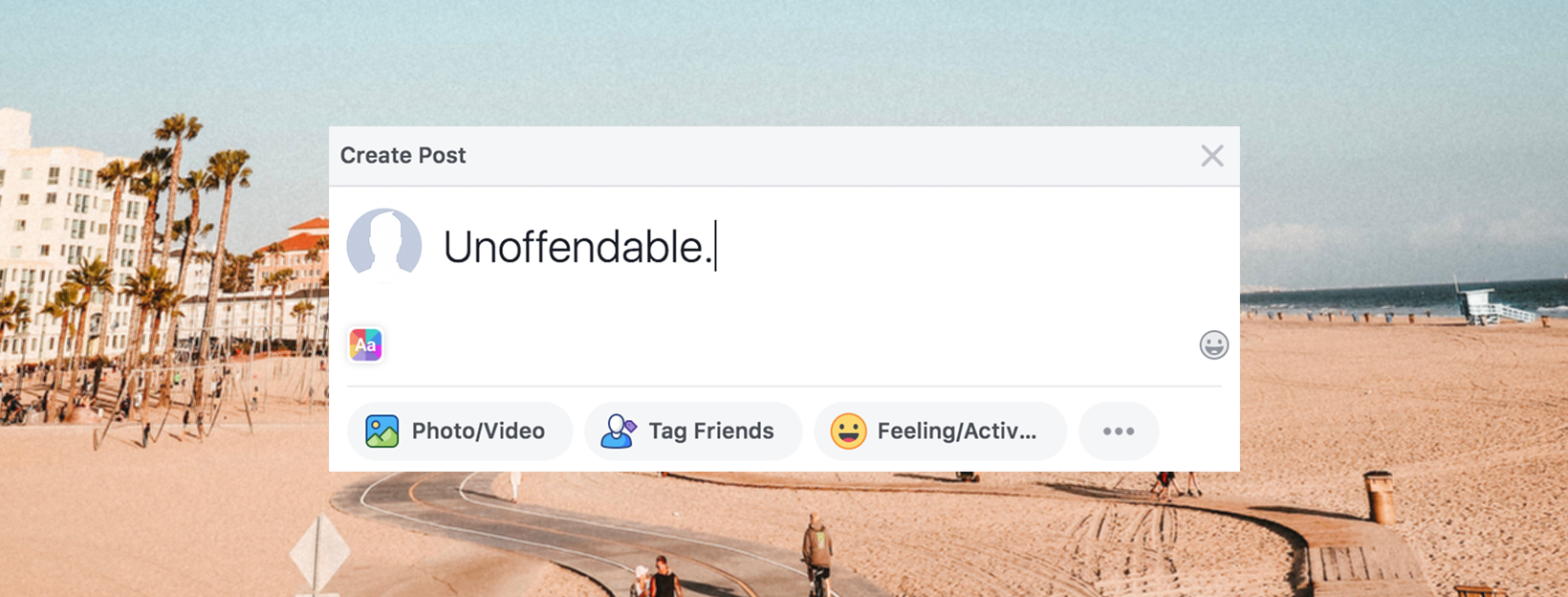Unoffendable

Unoffendable.
by Stephanie Miller
Hurt people, hurt people.
You’ve probably heard the famous quote, “Hurt people, hurt people.” While people may not intentionally hurt us, most of us can verify that this premise is true: if you live long enough, you will experience hurt. This is simply because people are people and only God is God. People are flawed. Sin has fractured the lens through which God intended for us to view the world and we are all a little broken. Specifically, I have met many people who are shocked when they are hurt by individuals in the church. To this I say, we are all human and we are in a constant battle between flesh and Spirit, righteousness and sin. This is so clearly demonstrated in the existence of the epistles in the New Testament. There are several books of letters written to the people in the church which address real problems, fighting and quarreling to name a few. James put it so well when he posed the question to Jewish believers in chapter four verse one, “What is causing the quarrels and fights among you? Don’t they come from the evil desires at war within you?” While we are in this war, God gave us the greatest weapon when He made His spirit available to us. We can be unoffendable, but we can only live this way by making His Word our standard rather than our feelings.
Identity
On a base level, I believe in part that offense can be traced back to fractured identity. We are human beings, but God has a purpose and plan for each of us. He wants to restore our God-given identities to us, so that we can reflect Him and not sin. When we are secure in who God made us to be, we will answer to what He calls us. On the other hand if we are insecure in our God- given identities, we are susceptible to answering to anything. If you do not know who you are, people will try to tell you who you are and should be. Every hurtful statement will then ring true because it will line up with the lies of the enemy and your own insecurity. The enemy will always try to keep your identity hidden from you. If he can keep you focused on what others say you are, you will eventually accept that as truth. This is why it is crucial to know who God says we are, and to know that His word is the truth which defines us.
When we know who we are, we can weigh what others say against what God says. God’s word wins every time. When confronted with hurtful statements or situations inside and outside of the church, we can then choose not to be offended. One of the most freeing things I have ever been told was that “You are not obligated to, nor should you, accept as truth every statement that people make about you.” If we are struggling with identity, it’s time for us to get in God’s presence through prayer, worship, and reading His word. If we become like the five people we spend the most time with, then God should be at the top of the list. If we spend time with Him, we will know Him and His voice will be familiar to us. It would be a shame if while God is whispering the truth over us, we forfeit the strengthening and redeeming truth in favor of a shouted lie.
What to do when you’re hurt, or already offended.
Personally, the first thing I do is ask myself, “Is there any truth to what this person is saying?” I ask God to reveal that to me, as well. If there’s an opportunity to grow, always take it- even if it wasn’t presented in the most comfortable or in the kindest way. Sometimes we get upset when people speak the truth because we didn’t want to hear it. Don’t stay salty- turn it into seasoning and be better. Other times the instinct is to simply cut people out of our lives, but that is not always the wise thing to do! Doing so can rob others of the opportunity to make amends, or for both parties to learn a lesson. We may also alienate people who actually do have our best interest at heart simply because we were led by our feelings. If someone is honest enough to lovingly point out something we do not see in ourselves, that’s a friend you want to keep. We need people in our lives who we can be transparent with, even if it’s uncomfortable or hurts us. Iron sharpening iron may not always be comfortable, but it is still a good and necessary thing.
If the answer to that first question is no, then confront that person in love. Pray about it and go to the person who hurt you directly. What does the Bible say? Matthew 18: 15-17 teaches us that “If your brother sins against you, go and tell him his fault, between you and him alone. If he listens to you, you have gained your brother.16 But if he does not listen, take one or two others along with you, that every charge may be established by the evidence of two or three witnesses. 17 If he refuses to listen to them, tell it to the church. And if he refuses to listen even to the church, let him be to you as a Gentile and a tax collector.” (New Living Translation) Notice in the passage where it says, “between you and him alone.” Do not escalate the situation by spreading the conflict to anyone who will listen. Instead, respectfully go to that person first. It may be that he or she did not realize they hurt or offended you. Give them a chance and you may find that relationship strengthened rather than abandoned.
Is It Too Late?
In medicine, pain is a sign that something is wrong and something must be done about it. Ignoring the undiagnosed source of pain almost always leads to further injury, which sometimes could have been avoided. If it hurts, you need to address it. On a heart level, if a person continues to hurt you after you have confronted them and either nothing changes or they refuse to listen to you or to accept wise counsel from a spiritual leader, it may be time to separate. Separation in this case refers to no longer walking in close friendship with that person. It doesn’t have to mean that you ignore their existence. When we separate ourselves from people in this way we are always to do so prayerfully, with a clean conscience and a forgiving heart, knowing that God is leading our paths apart. Oftentimes separation can make room for God’s promises to enter our lives as in the case of Abraham and Lot. Other times separation may also be for our protection; but if we prayerfully choose the path that honors God, we can trust that God will handle the outcome. This frees us to pray for those who hurt us or choose to do wrong, knowing that if they remain unrepentant and forsake God’s forgiveness, the end will be worse for them than any grudge we could hold.
Before confronting someone who has hurt or offended you, make up in your mind that you will forgive them regardless of their response. Paul wrote to the Colossians, “Make allowance for each other’s fault, and forgive anyone who offends you. Remember, the Lord forgave you, so you must forgive others.” We did not earn forgiveness. Jesus died on the cross and freely forgave us; therefore, we do not make others “pay” for what they did. We are not entitled to withhold forgiveness because it is a command, but it is also for our freedom. Even Paul, who became a driving force in the kingdom of God, called himself the worst of sinners. We should always operate in humility.
Reminder to the Church
As the church, we must also remember that HOW we send a message can often be just as important and communicative as the message itself. As Christians we should strive to be like our Savior. Kind and compassionate, forgiving, loving, generous and gracious, accepting of people but not of sin, and understanding. Though we may unintentionally hurt someone, as much as we are able, we ought not to give anyone a reason to be offended. If we are genuinely speaking the truth in love, God is able to use that; however, we cannot use opportunities to speak into the lives of others as a way to tell people what or how we think they should be. Let’s remember that being “blunt” and “honest” without being loving and prayerful when we speak to others is not being like Jesus, not kind, nor is it effective. Our goal is to be a collective of clean, uncontaminated vessels for God to use to accomplish His purpose. To do that, we must empty ourselves and let Him refill us on a regular basis so that what comes out of us, is a reflection of Him. Then we can consider people through eyes of grace and seek to understand before judging. God forbid we use “blunt honesty” and “speaking the truth” as an excuse to be rude or mean, or to cut others down. That is not our job. The church is supposed to be a place of healing. While the truth may not always make us comfortable, especially if we are in a position of growth or needing to change, our words spoken and actions performed in love should bring healing. The end will be hope, life, peace, and unity.
Moving Forward
The truth is that while you cannot choose who hurts you, you can choose who offends you. You can choose to be unoffended because you know that when people do hurtful things, it is usually a reflection of what is going on inside of them, rather than a statement about your character. Even good people make mistakes and even people we admire have the potential to disappoint or wound us. Everyone has struggles that nobody sees. Pray for the person who hurt you. It is possible, and likely, they are going through something difficult too, and need prayer! Regardless of whether things change or that person shows remorse, pray for them. God is able to change hearts- yours and theirs. When you take your hurt to God and give it to Him, He can heal your heart and direct your steps; but when you stew in the hurt, like a swamp, you create a breeding ground for offense. Offense will always make the problem seem bigger and feel more painful than it truly is. Know that while you cannot control others, you can control yourself. Commit to pursuing peace to the best of your ability just like Romans 12:18 says.



